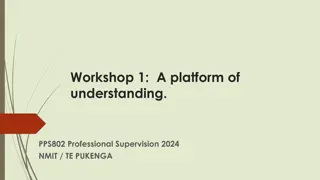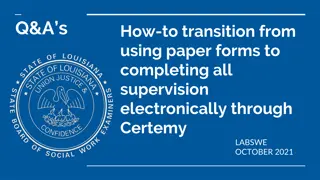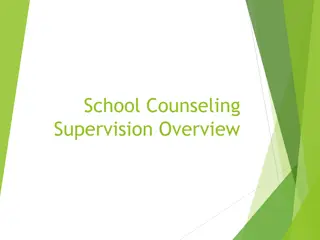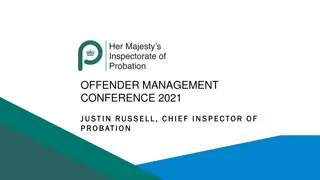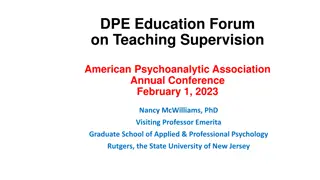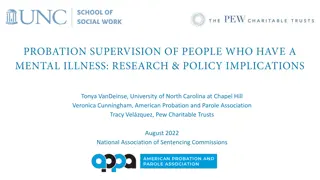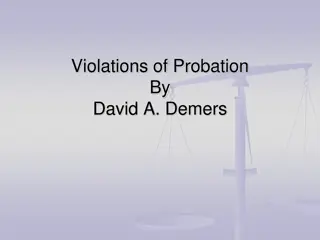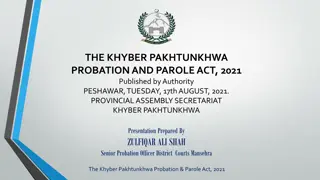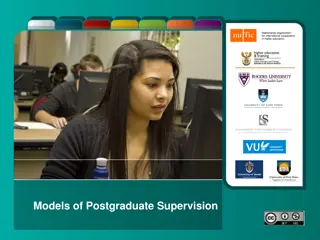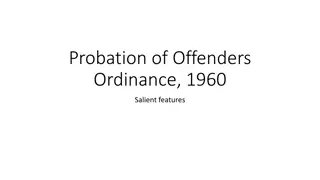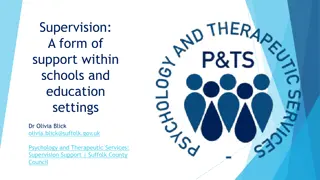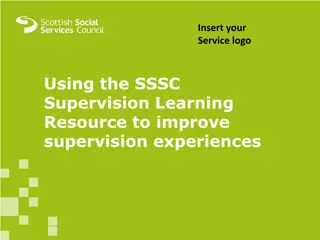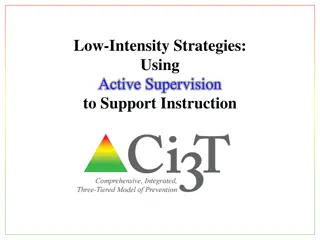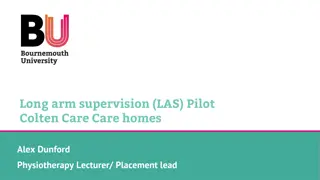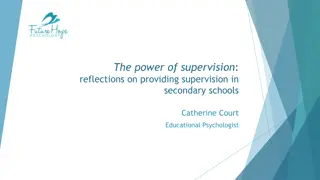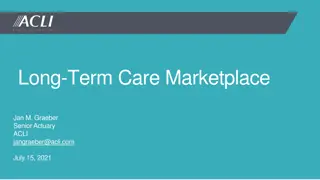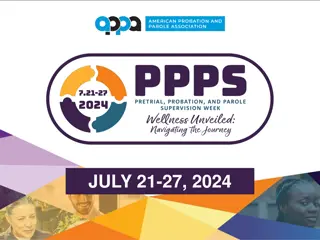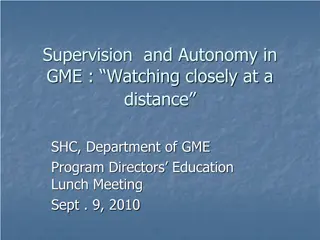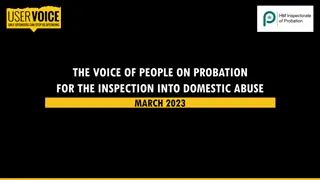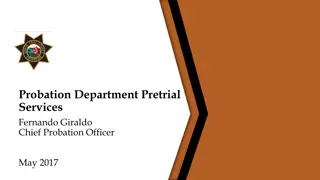Long-Term Impacts of Probation Supervision: A New Perspective
Evaluations of community supervision often yield negative findings due to short follow-up periods and flawed data. Stephen Farrall's research challenges this perception by suggesting a more nuanced understanding of probation's long-term effects. By employing self-report data, longer follow-up periods, and examining probations' impacts on even the most entrenched offenders, Farrall argues for a new way forward in assessing the effectiveness of probation supervision.
Download Presentation

Please find below an Image/Link to download the presentation.
The content on the website is provided AS IS for your information and personal use only. It may not be sold, licensed, or shared on other websites without obtaining consent from the author. Download presentation by click this link. If you encounter any issues during the download, it is possible that the publisher has removed the file from their server.
E N D
Presentation Transcript
Frank Dawtry Memorial Lecture 2012: The Long-Term Impacts of Probation Supervision Stephen Farrall, Centre for Criminological Research, School of Law, University of Sheffield.
Tales of Woe? All too often evaluations of community supervision end in downbeat assessments. Null (or negative) findings litter the evidence base. But, such studies often use short follow-up periods (two years), rely on officially recorded data (which has flaws) and count ANY re- offending (or more accurately) reconviction as equalling failure .
All a bit of a headache? Influenced by aspirin models of impact? (Take a tablet, within a short time it reduces the headache, but in effects wear off over time).
Assumed model of impact (based on aspirins) Level of pain relief Time
A New Way Forward? Q: Can better research designs produce more reliable data? Self-report data; longer-term follow-up periods; more nuanced understanding of reoffending. I shall argue that probation can assist even the most entrenched of offenders to stop offending, BUT that the 'unfolding' of the effects of probation supervision can take very many years (so NOT like an asprin: accumulative not dissipative). [So Answer = yes ].
An Outline of My Talk Headlines news from earlier sweeps of interviewing. Brief case studies of what PRs said about supervision. Link this to other life changes. Try to peer inside the black box of supervision. Draw some wider lessons.
Tracking Progress On/After Probation 199 daily traffic probationers recruited into the study (aged 17-35) Autumn 97-Spring 98. They and their POs interviewed at the start of their orders, six months later and at end of order (1997-1999). 4th sweep (1/4 sample) follow-up (2003-04). 5th sweep fieldwork (2010-2012). 104 int s. 1,155 interviews (612 probationers, 543 POs).
What did PRs say during/soon after probation supervision? (SWPs1-3) They felt that they had not got a lot from their supervision. 1/3 said that their POs had done little or nothing to assist them in tackling an obstacle to desistance. (Farrall, 2002: 92). PO/PR: <50% of obstacles were resolved Desistance was all my own work . Generally dismissive of probation.
What did PRs say during/soon after probation supervision? (SWPs1-3) Looking at data from POs generated similar conclusions: For family/employment obstacles it appeared that POs felt that the PRs had taken the lead (and were more successful than POs, Farrall, 2002: 161, Table 9.2a). Yet: when POs did get involved, success rates went up (Table 9.2b; 58% to 72%).
What did PRs say during/soon after probation supervision? (SWPs1-3) So disappointing findings but some glimmers of hope in that POs did appear to be able to enhance chances of change. In that they could assist PRs to successfully tackle an obstacle to desistance.
What did PRs say during/soon after probation supervision? (SWP4) Now 2003-4 (so 5yrs on). Overall picture still rather depressing; few PRs suggested that they had taken much from probation (Farrall & Calverley, 2006). But there were the first signs from some of the PRs that they had taken something from probation.
What did PRs say during/soon after probation supervision? (SWPs1-3) Anthony: Started 1yr order for violence. Typical: male, aged in late 20s/early 30s, intermittent manual worker, drinking heavily, using soft drugs + pills, poor educational attainment (but clearly bright). Got on well with PO. Order ended early in breach (failure to attend anger man course). Drunken violence at weekends.
What did PRs say during/soon after probation supervision? (SWPs1-3) Continued to offend, but growing less frequent over time. Move away from town centre to suburbs also associated with reduction in episodes of drunken violence. Settles down with new partner; blended family . Working on and off.
What did PRs say during/soon after probation supervision? (SWPs1-3) If I was in a club and I was pissed up I wouldn t think ummm, I d better not get in a fight cos I m on probation and I don t want to go to prison no more . It wouldn t enter my head. Anthony, SWP2 It [anger management] was a load of bollocks. You sit there with eight or nine other kiddies, just discussing stupid things, like I just said. Like stupid questions. Or like, they give you a form, you go there every week, they give you a form, you have to tick the box how you feel today and all that kind of thing, what s wound you up that week and stuff like that. Stupid things really. Anthony, SWP3
What did PRs say during/soon after probation supervision? (SWP4) I wouldn t say anything s [that probation officer said] stuck with me but it chipped away if you know what I mean, it sort of chips away at you. [SF: Right]. They don t stick in your head but occasionally you ll get that little thought of maybe I shouldn t do this because I ve . And maybe he told me about this or you know what I mean? It chips away at you I suppose . Anthony, SWP4
What did PRs say during/soon after probation supervision? (SWP5) I suppose anger management did help a little bit when I got that through probation and that, cause I d be seeing this stupid [PO], and she d be telling me stuff I don t really want to hear and then a couple of days later I d just go and see [PO] and he d say how did anger management go and we d talk about anger management. So I suppose, and from that respect it makes you analyse what you ve done, who you ve done it to, how you can change it. It gives you them tools, it tells you the tools, whether you want to bring them onboard is up to you . SWP5 Anthony,
What did PRs say during/soon after probation supervision? (SWPs1-5) Summarising what we learnt: Probation appeared to offer little whilst on probation. Started using insights from probation after having been on probation. So impact of probation sometime after probation and related to other life changes too.
Exploring this Quantitatively Sweeps 2-5 we asked: Did you learn anything as a result of being on probation? Did PO say/do anything that will help you stay out of trouble in the future? Did you get helpful advice from your Officer? Each Q scores 1 for a positive answer, 0 for a negative. Summed this creates a Probation Impact Scale (0-3).
Percentage Reconvicted to April 2010 by Prob. Impact Scale (SWP2) [n=119] 100% 90% 80% 70% 66 68 77 79 60% reconvicted 50% not reconvicted 40% 30% 20% 34 32 23 21 10% 0% 0 1 2 3
Percentage Reconvicted to April 2010 by Prob. Impact Scale (SWP5) [n = 97] 100% 90% 80% 70% 71 75 60% 84 89 reconvicted 50% not reconvicted 40% 30% 20% 29 25 10% 16 11 0% 0 1 2 3
Evidence of Impact? Some evidence but not over-whelming: (None of this reaches statistical significance). Percentage point difference between scores 0 and 3 is interesting: at SWP2 = 11 (34-23). at SWP5 = 18 (29-11). Suggests that over time differences (in terms of reconvictions) start to emerge.
Opening the Black Box How is impact produced over time? Can we relate staying out of trouble back to probation supervision? What does not appear to help? What lessons about assisted desistance can we extract? Case studies from SWP5
Bobby: drink-related offending All data from SWP5 BH: Did PO say or do anything to try and help you stay out of trouble? Bobby: Yeah, well she she told told me what she was for the best but the alcohol, she just says, You ve got to can it, it s obvious that s the root, that is the be all and end all of what s happening, if that, you know, she put everything I d done, Were you drunk when you did this, were you drunk when you did that? yes to every single thing, everything, there wasn t even one that it wasn t, it was, it was literally and so we worked on that
Bobby: drink-related offending All data from SWP5 BH: I guess what I was wondering, sort of did you you know, did you learn anything while you were on probation with PO? Bobby: Yes, yeah I did because also we we went across what it [alcohol] does to your body for one thing, and what units are and all that lot, you know, and how many and and so on and so forth. So that side of things, yeah, I didn t learn and I was quite surprised about how much of a poison it is really.
Bobby: drink-related offending Bobby: But it s hard to it s like leading a horse to water, you can t make it drink type thing, although I did learn that I wasn t fully committed to stop so my fault, nobody else s, you know. . BH: Did she give you any advice on managing the drinking? Bobby: Yeah, I had a scale of what I drank, I had to write down what I drunk, how I felt, blah blah blah, which I lied about, I ll admit now [both laugh], yeah, but again she can only do so much, I mean I only saw her, what an hour or two every week, so that s not really going to solve much. It was good to have somebody to talk to though about it.
Bobby: drink-related offending Bobby: It when I started to see my son growing up I thought, I don t want him to know I mean he s chances are he ll find out about what I ve done, what I ve been been doing, drinking wise and everything else, he ll hear it off, I don t know, off his mam probably because, you know [laughs], I m not her best best person in the world at the minute, but fair enough he ll find out, he ll it's up to him how he deals with it. I m I won t deny things, I won t lie to him, but I thought I ve got a little man here and, you know, that s a big eye- opener. Son born 2006; last conviction 2008 (but some trouble into 2009); reports walking away from fights in 2010.
Peter: injecting user Peter injecting since early 1995 (on and off). Stopped 2004-08. Went back to injecting late 2008 (family death). Not used since early 2009. SWP5 interview: Peter: I was talking not long back about the criminal offences and a lot of the things I did, I didn t actually do it out of being calculated, I just did it because I did it, it was just spur of the moment, dependant on the particular scenario and who I was with, and I just did and I never really thought about the consequences of it and all the ins and outs, I just got on and did it. And in that sense I ve changed a lot, because I do think a lot more about the consequences of things and how it affects other people. And funnily enough, the root of that started on probation.
Peter: injecting user SWP5 interview: Peter: And it kind of planted a seed, and it took a few years before I really started to act on it, but I think yeah, probation probably started all that off. Perspective and seeing things from a different angle, instead of thinking from my point of view or thinking it from somebody else s.
Peter: his POs insights PO SWP2 interview: Has anything that you ve said or done been helpful in keeping Peter out of trouble? I doubt it. I don t think other than reminding him that he is on probation we achieved anything else. Sometimes when you say something that sticks in the mind [it] comes out only a long time after the event. Sometimes people remind you of something you said 5yrs ago .
Its Good to Talk (with apologies to Bob Hoskins and Buzby) Talking previous derided by PRs: We talked a lot about [drug use], but that is as far as it goes. I didn t get much help Charlotte, 2nd interview. ... but becomes appreciated later:
Its Good to Talk (with apologies to Bob Hoskins and Buzby) We d just talk about things and that. Just life in general, I never missed my appointment with him. [ ] it was something to sort of look forward to going. Sort of like, get out and talk to someone. Cause like, alright fair enough, like you re married and you ve got a partner and whatever, but you can talk to your partner about things and that. But like sometimes, whatever you talk to them about, they interpret it in a different way. I mean it doesn t sort of make sense to them, what you re trying to get out. You know what I mean, so I d like talking to someone else. So that helped as well . Elsayed, 5th sweep.
Practical Help Key Too Downplayed by some critics of the project. Kirsten: the CV that they wrote for me at probation, I still use it. Derek: [PO] did help me, you know, in some ways, you know, if anything was messed up with my benefits or anything like that she d be there for me. Clifford: A lot of it was helping me to get a job really. If anything they helped me more than the Job Centre really. They sat down with me, helped me do CV s and what have you.
Befriend, Advise, Assist (Old Message in a New Bottle?) Brett: [ ] you did listen to her because she wasn t ... she was a nice lady actually, so you d listen to what she was telling you, and it was like good advice. Even though she was helping you on her own to get somewhere to live, you had to listen to what she was telling you, about what to do, even when probation was finished.
Befriend, Advise, Assist (Old Message in a New Bottle?) So, practical help a) builds trust b) Helps with engagement and c) creates compliance in the long run.
Mode of Delivery as Important as Content I was seeing one [a counsellor], the one I was seeing was great and I thought Ah, she, she s alright her but then [PO] started sending me to like fucking stupid classes and, and I can t do things like that me, I can t, I m alright talking to someone but I can t sit there in a classroom kinda thing and stand up and like that s how it come about with the thing first. I couldn t .., I told him I said I cannot stand in a room I said I couldn t do in school I said, you know what I mean, I said it s like you re sending me back to school I said and I can t do things like that, you can t send me to stupid classes. Anger this and anger that John (SWP4)
Lessons How is impact produced over time? Explaining very basic things to PRs. Talking things through with PRs. The interaction of the above with naturally occurring changes in social/personal lives. (This last point implies community, not custodial, sentences).
Lessons Can we relate staying out of trouble back to probation supervision? I would say so; numerous references to supervision as a seed / starting point for change. Quant data also suggests impact. Advice given (even if NOT used at the time of delivery ) IS used as circumstances change. The advice is stored /drawn upon later.
Lessons What does not appear to help? Group programmes reminded some of past failures (at school). Unclear to PRs why they were doing some things.
Lessons What lessons about assisted desistance can we extract? People are future orientated; but for some probation felt too concerned with the past:
Mickey (SWP3) Something to do with self progression. Something to show people what they are capable of doing. I thought that that was what [PO] should be about. It s finding people s abilities and nourishing and making them work for those things. Not very consistent with going back on what they have done wrong and trying to work out why cause it s all going around on what s happened what you ve already been punished for why not go forward into something For instance, you might be good at writing - push that forward, progress that, rather than saying Well look, why did you kick that bloke s head in? Do you think we should go back into anger management courses? when all you want to be is a writer. Does that make any sense to you at all? [SF: Yeah, yeah. To sum it up, you re saying you should look forwards not back]. Yeah. I know that you do have to look back to a certain extent to make sure that you don t end up like that [again]. The whole order seems to be about going back and back and back. There doesn t seem to be much forward .
Lessons What lessons about assisted desistance can we extract? Some aspects of the social work model appear to work . (Bad news for Michael Howard, New Labour and the past 15 or so years, but good news for retro-fitting programmes like SEED?).
Lessons What lessons about assisted desistance can we extract? At this stage I d like to propose a model of how OMs assist in the production of desistance. Tentative; would appreciate your insights.
Modelling Impact of Supervision Assume an individual with a high degree of embeddedness + minimal desire to change Period on probation Individual Circ s: Episodes of good fortune Degree of embedded- ness in crimin- ogenic situations Naturally occurring life changes Sustained efforts at moving away from crime/ desistance Know- ledge/ insight gained from talking with PO Possibly kick- starts process of thinking about change . Little/no immediate response (especially if dealing with long term/entrenched offenders and/or structural issues) Reorient- ation towards conven- tional goals [Iterative processes] + Desire and Willing-ness to change Use of PO s advice Recollection of PO s advice
Possible model of impact? Level of impact Time
Implications? Clear Theories of Change ?: No thanks! Need longer assessment periods (>2yrs. 10yrs?). Need to accept periods of low/no impact. Need to recognise that other social/personal factors play a mediating role in probation work. More (and more rigorously designed) studies. Need to accept that some drivers to change operate very mundanely. User Surveys may contain flaws as they don t address long term impacts.
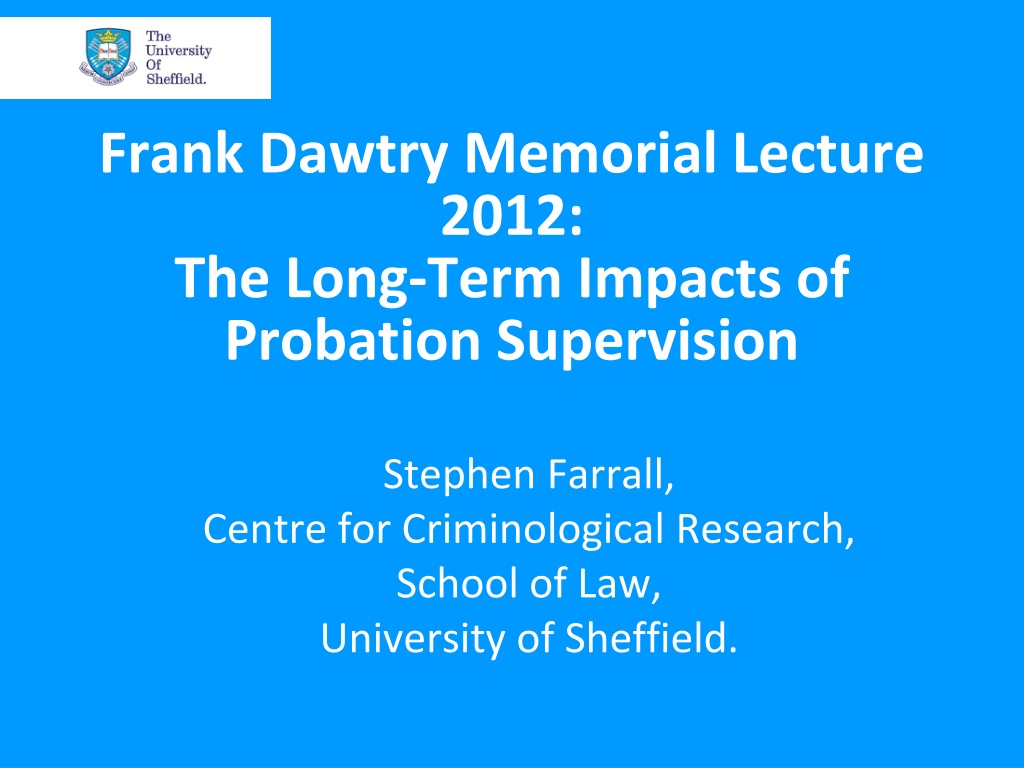
 undefined
undefined



